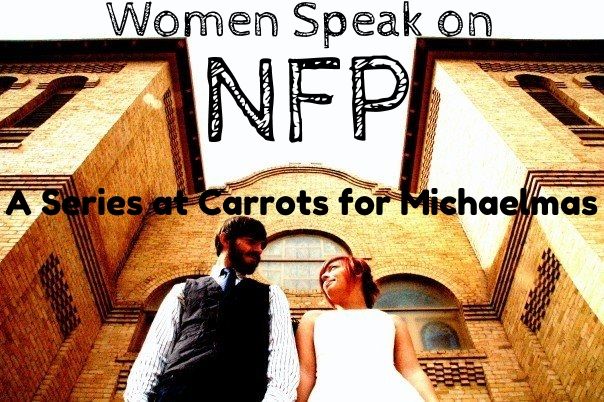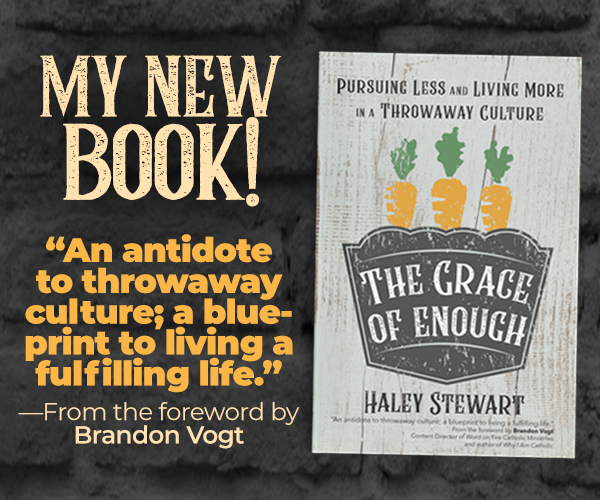
This is a guest post by Bonnie of A Knotted Life in the Women Speak on NFP series. In this series you will hear from women using various methods of NFP, some to avoid pregnancy, some trying to conceive, and their experiences.
Disclaimer: This series is not meant to be a substitute for any method of training in NFP! If you are interested in one of the methods introduced in this series, please contact a certified instructor for information about training in that method of NFP.
My husband and I took a class on the symptom-thermal method of natural family planning (NFP)* when we were engaged. There were four other couples in the class and by the last session we were the only ones still attending.
Sometimes I think about those other couples, the NFP drop-outs, and I wonder if life in their marriage beds is easier than it is in mine. Because I’ll you what, Carrots for Michaelmas readers, NFP has been a cross for me. It has brought about some wonderful things and people in my marriage, but has been a cross.
If you are thinking about practicing NFP I want to tell you a few things about my experience with it.
Let’s begin with the positives.
NFP has taught me a great deal about my body. Health issues have been resolved and finally understanding why my body does what it does has been empowering for me.
The practice of NFP in our marriage has strengthened our bond. My husband and I often talk about our home, our health, our support system, our budget, our plans, our kids, our hopes, our aches, our love, our God. We don’t argue about these things, or at least we seldom do, because we so frequently are discussing them. Our marriage, our friendship, our trust, and our appreciation of one another are all stronger because of those discussions.
Finally, using NFP (and being really bad at it) has given us six wonderful gifts from God: our kids. I may have gone through some of my pregnancies kicking and screaming (or moping and whining) but in the end God knew better than I did. My kids are awesome and being their mom is tied for first place with being their daddy’s wife in the “Best Thing I Ever Got to Do – Evah!” category.
But all that aside, it’s hard.
First, no matter what kind of NFP I use there is always someone waiting to tell me how I’m doing it wrong, not using the right one, or I just need to breastfeed my baby twenty-four hours a day and then! I will be able to use it effectively and not get pregnant. Believe me, it is not helpful, just frustrating.
Charting is a little bit of a pain in the rear, too. It takes a while to figure out what is what, and postpartum it can be incredibly difficult to play “Name That Fluid”. With kids waking me through the night, watching me pee, and commenting on my toilet paper it can be hard to feel like I’m doing my scientific best.
Postpartum NFP is confusing and near impossible to do for me. It’s come to a point where we don’t even practice NFP postpartum anymore because charting is so frustrating. The months of abstinence are tough because I really love my husband, he really loves me, and we have a happy marriage. It’s a sacrifice we make, though, because we also love God and want to follow His commands. But sacrifice, by its very nature, is tough.
Begrudgingly I will admit that, in the end, this is also a positive. Picking up my cross and following Christ has made me trust God more. It’s made me love God more. It’s even brought more peace to my life. So maybe NFP isn’t all bad.
But it’s still a cross.
*To clarify terms, when I use the term “NFP” I mean the couple is both charting and praying. Just charting? I’d call that practicing FAM (fertility awareness method). Just praying and letting happen what happens? I’d call that having sex.

Bonnie Engstrom: Catholic wife and mom of 6; I bake, cook, blog, and ignore the laundry. I’m really good at ignoring the laundry.
(Be sure to check out Bonnie’s blog, A Knotted Life, and her video series about celebrating the liturgical year!)

Thanks for writing this Bonnie! I don’t think we’re doing anyone a favor by whitewashing NFP. It’s tough, but so are most things worth doing. I don’t know anyone who loves NFP (unless you count the people in the field of sunflowers on the cover of that pamphlet in my drawer) but I also don’t know anyone who has ever fallen off the wagon, or who regrets her children.
“I also don’t know anyone who has ever fallen off the wagon, or who regrets her children.”
I do on both counts, especially the first, but occasionally the second, too. Some leave the Church entirely.
Suffering can build faith and bring one closer to God, but there is a very real danger of being broken by it. If someone is in a bad situation with NFP, they shouldn’t hesitate to get (spiritual and/or methodological) help.
The ‘to clarify terms’ made me actually laugh out loud. Funny. 🙂
Had to say, Bonnie, I actually just did my first Undoer of Knots rosary. I had never paid much attention to our Lady under that title and anyway all that to say–I really like your blog name.
Everything you say in this post is all too true in our experience as well. Plus its frustrating when you’re abstaining and all conditions are right and then you realize, you have to “hold that thought” for a minimum of 3 more days… lol.
Yey for crosses.
<3 jeni
I agree with you on the difficulty of practicing NFP postpartum. I can’t get a decent temperature with the interrupted sleep that has been my life with an infant. To make things worse, it appears that I’m almost constantly fertile postpartum. I got frustrated with all of that and adopted more of a caution to the wind strategy because after my first pregnancy it took a year for my cycle to return, and I do not think it would be healthy for our marriage to abstain that long. Now that my son is drawing closer to 9 months I’m thinking I may need to attempt NFP again. Anyway, thanks for sharing your experience.
Thank you – it’s nice to know I’m not alone! Best of luck with your praying and charting! 🙂
Great post!!! So real and funny and sweet.
Yes, NFP can be difficult no matter the method because it does take some self-control and sacrifice. My husband and I can truly say that we love NFP and all it offers us! You may want to look into the Creighton Model- no need for temps or internal checks. Simplest method to use and incredibly reliable (even breastfeeding!). It’s the only method to have the added medical aspect- physicians actually trained to diagnose and treat a variety of issues- even post-partum depression. Check out the website- http://www.fertilitycare.org/
It has changed my health and my marriage and strengthened my faith!!
Oh Kimberly, I really appreciate your sincerity here but I just have to laugh. Let me share two quotes from above that directly address your well intended comment about Creighton:
. “First, no matter what kind of NFP I use there is always someone waiting to tell me how I’m doing it wrong, not using the right one”
and
“…postpartum it can be incredibly difficult to play “Name That Fluid”. With kids waking me through the night, watching me pee, and commenting on my toilet paper it can be hard to feel like I’m doing my scientific best.”
😉
Kimberly,
We had a very bad experience with Creighton. My wife would give it the exact opposite description of what you just wrote: Complicated, unreliable, and allowed physicians to misdiagnose and incorrectly treat her. Breastfeeding? Our children could not be closer together. The experience harmed our marriage and our faith.
What we use now is “Billings-thermal”. Others love Marquette. Clearly you had a good experience with Creighton.
There is no “one method”. Different women show different symptoms and will find different methods may work better. If you are happy with your method, great! If not, another may work better.
Well said, Bonnie. NFP is a cross, and a tough one at that. Thanks for sharing.
I love your honesty Bonnie and appreciate it so much. It can be really hard for those of us who really are strained under this cross because of the lack of discussion in the Catholic community, and lack of genuine support. It’s hard for others to understand if they’ve never had difficulties with practicing NFP, and its difficult to find support between those who think we have “tried and can just go back to contracepting” and those who think people should have as many kids as possible. I hope that science continues to improve to help those of us who have such a hard time. Its a daily cross that effects almost every part of your life.
Thank you for so honestly sharing your heart and your experience, Bonnie. As a relatively newly-married, NFP-practicing gal, it is good to know my husband & I are not alone (and I am sure we have a lot to learn with the years and experiences to come!). It’s a comfort to have others on the journey, with all of its ups and downs.
And thank you, Haley, for hosting this wonderful series!
Ahhh–postpartum! There is no NFP method that can carry the confusion that comes with the postpartum period, in my mind.
Bonnie, I appreciate you sharing your experience so much. We are in postpartum period #3 and I am praying, praying, praying for the graces to make it through this time, and throwing in some hope that I will have a solid opportunity to practice NFP during regular cycles…or at least the courage to go through it all again.
It’s heartening to see other couples are living the practice, and sharing their frustrations for the others out here.
Thanks for sharing this, Bonnie. What a different experience from my own! I’m a Protestant, and I generally consider what I do “FAM,” although I DO pray — though my prayers are generally of the “Please, please let me get pregnant this time, God” variety.
So many different experiences! That’s why it’s so great to share them together like this.
Kathleen, I hope and pray God blesses you with children.
Thanks for your comment. In writing and talking about NFP I’ve found that those three little letters mean very different things to different people – which can make talking about it super confusing. I hope you didn’t mind my pretty generalized clarification of terms! While I definitely implied that FAM-ers don’t pray about God’s will I know that’s not true.
Bonnie,
Thank you for being so honest. I’m one of the NFP drop-outs, but only after a solid decade of trying different methods of NFP, working one-on-one with practitioners, etc. After diagnosis with a very serious chronic disease and several pregnancies after the diagnosis which wreaked havoc on my body, my husband said, “No more!” and sacrficed his body to save mine (he had a vasectomy)
The important thing for everybody to remember is that there is no way to try to fool mother nature without paying a price of some sort. That includes every form of contraception as well as NFP. Nature intends for us to make love when we are fertile and have babies, and anything we do (whether natural or artificial) to prevent getting pregnant is going to have consequences. In our case, my husband decided that the risks of vasectomy were far less than the risks to my health of constantly getting pregnant, as well as the risks to the happiness and harmony of our marriage that frequent, protracted periods of abstinence bring.
I hate the idea of women putting hormones and other artificial substances (IUDs strike me as downright barbaric) into their bodies and love the concept of NFP/FAM, so I really do hope that the science continues to improve the experiences of women like you and me for whom fertility remains largely a mystery hard to pin down, no matter what method of NFP is used. I know a lot of unhappy NFP-users, many of whom are now entering that peri-menopausal period that makes everything even more confusing, and it would be a great service to them if technology could pinpoint ovulation with a greater degree of certainty.
I agree that if you are a very close couple (my husband is my very best friend, a wonderful life partner who shows his love for him in a myriad of ways every day of our lives), and your body doesn’t cooperate with very clear and easy-to-interpret signs of fertility and regular cycles, NFP can be very, very hard on the relationship. I don’t regret our 10 years of honestly giving it our very best, though, any more than I regret the years I was nearly debilitated by my illness. Every bit of suffering we have been through together has made our relationship even stronger, and it has also made me so very grateful for good health and intimacy. Plus, like you, I have six wonderful children to show for our NFP efforts!